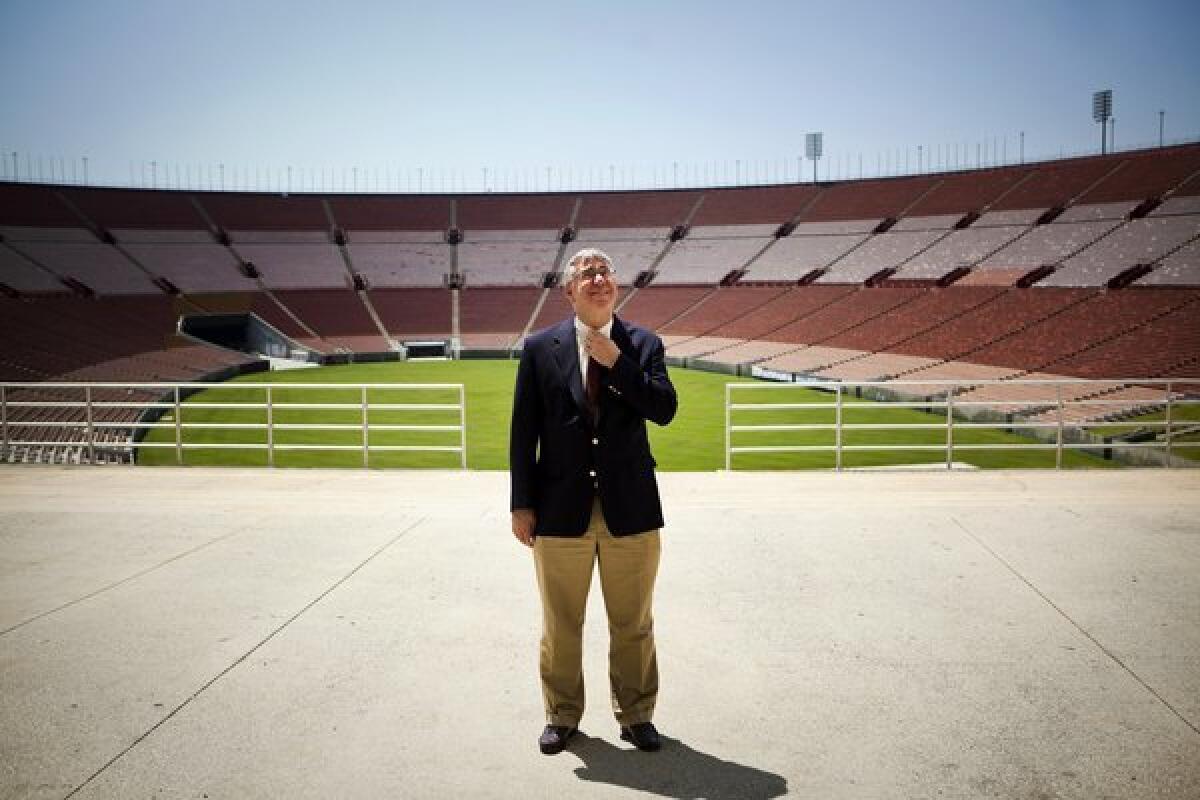Coliseum chief says he can’t recall details on record requests

The top administrator of the Los Angeles Memorial Coliseum testified Tuesday that he could not recall key details of how he responded to document requests under the state’s open-records law, including the search for a missing email from a former stadium manager indicted in a corruption scandal.
John Sandbrook also said during the deposition that he did not consider himself a negotiator of the controversial Coliseum lease proposal that would give USC control of the taxpayer-owned stadium, even though he identified himself as such on numerous meeting agendas he drafted.
The deposition was taken as part of a lawsuit by the Los Angeles Times and a 1st Amendment group, Californians Aware, that alleges the Coliseum Commission has violated state law by withholding emails and other records from the public and breached a separate statute by conducting months of secret deliberations on the pending USC lease.
DOCUMENT: Coliseum agenda identifying Sandbrook as a negotiator
Sandbrook refused to answer questions in a March deposition after his lawyer objected to the presence of two Times reporters. The attorney, Deborah Fox, later asked the court to bar the reporters from the deposition, but Superior Court Judge Luis A. Lavin rejected that motion and ordered Sandbrook to testify.
According to Fox’s estimate in court papers, the unsuccessful bid to oust the reporters cost the public more than $33,500 in legal fees.
Tuesday’s session focused largely on Sandbrook’s efforts to locate and release emails and other documents that The Times sought under the California Public Records Act. Some of those records were not produced for seven months, despite a requirement in the act that they generally be made public within 10 days and, in certain circumstances, 24 days.
Asked by Times attorney Jeff Glasser when he started the search for the records, Sandbrook said: “I have no recollection of when I began that process.”
Sandbrook said the commission never released the email from Leopold Caudillo Jr. -- a copy of which The Times obtained from a third party -- because the Coliseum staff could not find it. He said he considered the absence of the email “puzzling,” but did not know or could not remember if the staff searched for it in the commission’s email trash or folders other than those for sending and receiving.
He said the records search may have been “partially lacking, but 20-20 hindsight is always useful.” Caudillo is accused of felony conflict of interest by directing Coliseum business to a firm he controlled. He has pleaded not guilty.
Two documents sent by USC to the commission show that a school official was concerned that a Coliseum employee had “pirated” software for the stadium control room, with one of the records naming Caudillo. The commission -- made up of nine city, county and state representatives -- failed to release those documents after The Times requested any records involving allegations of software licensing violations.
Sandbrook testified that he did not believe the documents should have been released because “the term ‘pirated’ can mean various things to various people,” and not necessarily licensing violations. The Times eventually got the documents from USC through the lawsuit.
When Glasser asked if more documents could be missing, Sandbrook said: “Anything is possible.” He said he did not believe any records that should have been released were destroyed when the commission discarded 545 boxes of older documents, an undertaking that he called “spring cleaning.”
The deposition also zeroed in on the commission’s closed-door deliberations of the proposed lease, which awaits a final vote by a state board that owns the Coliseum land. The stadium panel’s agendas repeatedly identified the lease talks as a real estate negotiation.
Sandbrook said the proposal was discussed in secret because the commission faced a potential lawsuit by USC over its failure to make improvements to the Coliseum, where the school plays football. Government agencies are allowed to deal with some legal matters in private.
However, confidential commission records obtained by The Times for most of the nine months of deliberations do not include the USC lease among the many items the panel listed as subjects of “anticipated litigation.”
DOCUMENT: Read the confidential commission records
Throughout the deliberations, the agendas identified Sandbrook as a negotiator, but he said Tuesday he merely offered administrative support to the three commissioners who led the talks.
Some critics of the lease proposal have said Sandbrook and the commission granted too many concessions to USC during the negotiations. Sandbrook said he did not have that the authority to make concessions on his own.
The lease could give USC stewardship of the Coliseum complex, including the Sports Arena, and nearly all of the properties’ revenues for 98 years. The California Science Center board is scheduled to vote on the proposal Wednesday.
ALSO:
Dorner case: Investigation reportedly clears LAPD in firing
L.A. official recommends AEG to run the Convention Center
L.A. County delays decision on troubled foster care contractor
More to Read
Sign up for Essential California
The most important California stories and recommendations in your inbox every morning.
You may occasionally receive promotional content from the Los Angeles Times.












